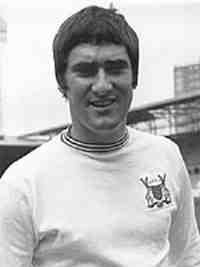 Baxter during his time at Nottingham Forest | |||
| Personal information | |||
|---|---|---|---|
| Full name | James Curran Baxter[1] | ||
| Date of birth | 29 September 1939 | ||
| Place of birth | Hill of Beath, Fife, Scotland | ||
| Date of death | 14 April 2001 (aged 61) | ||
| Place of death | Glasgow, Scotland[2] | ||
| Position(s) | Left-half | ||
| Youth career | |||
| Halbeath Juveniles | |||
| Senior career* | |||
| Years | Team | Apps | (Gls) |
| Crossgates Primrose | |||
| 1957–1960 | Raith Rovers | 62 | (3) |
| 1960–1965 | Rangers | 136 | (18) |
| 1965–1967 | Sunderland | 87 | (10) |
| 1967 | → Vancouver Royal Canadians (loan)[3] | 12 | (2) |
| 1967–1969 | Nottingham Forest | 48 | (3) |
| 1969–1970 | Rangers | 14 | (1) |
| Total | 359 | (37) | |
| International career | |||
| 1958[4] | Scotland Under-23 | 1 | (0) |
| 1960[5] | SFL trial v SFA | 1 | (0) |
| 1960–1967 | Scotland | 34 | (3) |
| 1961–1964[5] | SFA trial v SFL | 2 | (0) |
| 1961–1964[6] | Scottish League XI | 5 | (0) |
| *Club domestic league appearances and goals | |||
James Curran Baxter (29 September 1939 – 14 April 2001) was a Scottish professional footballer who played as a left half. He is generally regarded as one of the country's greatest ever players. He was born, educated and started his career in Fife, but his peak playing years were in the early 1960s with the Glasgow club Rangers, whom he helped to win ten trophies between 1960 and 1965, and where he became known as "Slim Jim". However, he started drinking heavily during a four-month layoff caused by a leg fracture in December 1964, his fitness suffered, and he was transferred to Sunderland in summer 1965. In two and a half years at Sunderland he played 98 games and scored 12 goals, becoming known for drinking himself unconscious the night before a match and playing well the next day. At the end of 1967 Sunderland transferred him to Nottingham Forest, who gave him a free transfer back to Rangers in 1969 after 50 games. After a further year with Rangers Baxter retired from football in 1970, at the age of 31.
From 1960 to 1967, he was a leading member of a strong Scottish international team that lost only once to England, in 1966, shortly after he recovered from the leg fracture. He thought his best international performance was a 2–1 win against England in 1963, when he scored both goals after Scotland were reduced to 10 players. In the 1967 match against England, who had won the 1966 World Cup, he taunted the opposition by ball juggling while waiting for his teammates to find good positions. Although he was given most of the credit for the 3–2 win, some commentators wished he had made an effort to run up a bigger score.
In his prime, Baxter was known for his ability to raise a team's morale, his good tactical vision, precise passing and ability to send opponents the wrong way – and for being a joker on the pitch. He also broke with Glasgow tradition by becoming friendly with several members of their major Glasgow rivals, Celtic.
Although he gained a reputation as a womaniser when he moved to Glasgow, he married in 1965 and had two sons. The marriage broke up in 1981, and in 1983 he formed another relationship that lasted the rest of his life. After retiring from football he became manager of a pub, and his continued heavy drinking damaged his liver so badly that he needed two transplants at the age of 55, after which he swore off alcohol. Baxter was also addicted to gambling, and is estimated to have lost between £250,000 and £500,000. After he died of pancreatic cancer in 2001, his funeral was held in Glasgow Cathedral and his ashes were buried at Rangers' Ibrox Stadium. In 2003, a statue was erected in his honour at his hometown, Hill of Beath.
- ^ "Jim Baxter". Barry Hugman's Footballers. Retrieved 11 May 2017.
- ^ "Rangers legend Baxter dies". BBC Sport. 14 April 2001. Retrieved 5 January 2009.
- ^ "NASL profile - Jim Baxter". North American Soccer League Players. Retrieved 11 October 2017.
- ^ "Matches played by Jim Baxter for Scotland Under-23". Fitbastats. Retrieved 8 October 2017.
- ^ a b Ronnie McDevitt (2016). Scotland in the 60s: The Definitive Account of the Scottish National Football Side During the 1960s. Pitch Publishing. ISBN 9781785312458.[permanent dead link]
- ^ "Matches played by James Curran Baxter for Scottish Football League XI". London Hearts Supporters Club. Retrieved 8 October 2017.